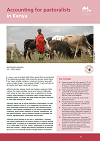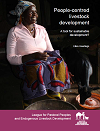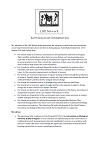Accounting for pastoralists in Kenya
Jacob Barasa Wanyama / League for Pastoral Peoples and Endogenous Livestock Development / 2020
Kenya has some 8.8 million people (1.73 million households) who identify as pastoralists. Of these, 4.0 million individuals (0.8 million households) depend directly on livestock. They manage about 70% of the country’s cattle, 87% of its sheep and 81% of its goats, 100% of its camels, 88% of its donkeys and 74% of the beehives. Their products include milk, meat, honey, beeswax, and skins. The pastoral sector was worth $1.13 billion in 2019: 92% from livestock and 8% from other products and services.
Kenya’s tourism industry is highly dependent on pastoralism as it helps to conserve wildlife and unique cultures. Pastoralism’s support to tourism was worth $29 million out of a total industry value of $2.5 billion.
Official surveys do not use a “pastoralism” category, but by comparing county-level data for production systems and populations it is possible to estimate numbers of pastoralists. Bodies mandated with data collection should segregate data between pastoralists, agropastoralists and farmers.

Download document


